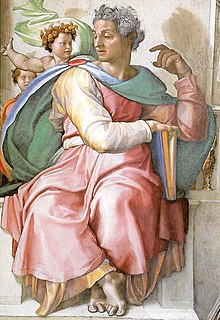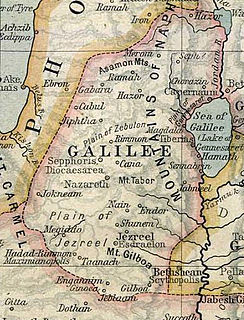Related Research Articles

Isaiah was the 8th-century BC Israelite prophet after whom the Book of Isaiah is named.

Matthew 1:22 is the twenty-second verse of the first chapter of the Gospel of Matthew in the New Testament. Joseph has just been spoken to in a dream by an angel.

Matthew 1:23 is the 23rd verse of the first chapter in the Gospel of Matthew in the New Testament. Joseph has just been informed of the nature of Jesus by an angel and in this verse the author of Matthew relates this to a quote from the Old Testament.

Matthew 3:3 is the third verse of the third chapter of the Gospel of Matthew in the New Testament. The verse occurs in the section introducing John the Baptist. This verse links John The Baptist to messianic prophecies.

Matthew 3 is the third chapter of the Gospel of Matthew in the New Testament. It is the first chapter dealing with the ministry of Jesus with events taking place some three decades after the close of the infancy narrative related in the previous two chapters. The focus of this chapter is on the preaching of John the Baptist and the Baptism of Jesus.

Matthew 4:14–15 are the fourteenth and fifteenth verses of the fourth chapter of the Gospel of Matthew in the New Testament. In the previous verses Jesus returned to Galilee after hearing of the arrest of John the Baptist and then left Nazareth for Capernaum. These introduce and then contain the first portion of a quote from the Book of Isaiah showing how these movements were preordained by scripture.

Matthew 23 is the twenty-third chapter in the Gospel of Matthew in the New Testament section of the Christian Bible and consists almost entirely of the accusations of Jesus against the Pharisees. The chapter is also known as the "Seven Woes" or Woes of the Pharisees. In this chapter, Jesus accuses the Pharisees of hypocrisy.
Matthew 16 is the sixteenth chapter in the Gospel of Matthew in the New Testament section of the Christian Bible. Jesus begins a journey to Jerusalem from the vicinity of Caesarea Philippi, near the southwestern base of Mount Hermon. Verse 24 speaks of his disciples "following him".

John 12 is the twelfth chapter of the Gospel of John in the New Testament of the Christian Bible. It narrates an anointing of Jesus' feet, attributed to Mary of Bethany, as well as a version of the triumphal entry of Jesus Christ into Jerusalem. The author of the book containing this chapter is anonymous, but early Christian tradition uniformly affirmed that John composed this Gospel.
Matthew 9:13 is a verse in the ninth chapter of the Gospel of Matthew in the New Testament.
Matthew 11:17 is the seventeenth verse in the eleventh chapter of the Gospel of Matthew in the New Testament.
Matthew 12:3 is the third verse in the twelfth chapter of the Gospel of Matthew in the New Testament.

Matthew 8:17 is the 17th verse in the eighth chapter of the Gospel of Matthew in the New Testament.
The New Testament frequently cites Jewish scripture to support the claim of the Early Christians that Jesus was the promised Jewish Messiah, but few of these citations are actual predictions in their original context. The majority of these quotations and references are taken from the Book of Isaiah, but they range over the entire corpus of Jewish writings. Orthodox Jews do not regard any of these as having been fulfilled by Jesus, and in some cases do not regard them as messianic prophecies at all. Old Testament prophecies about Jesus are either not thought to be prophecies by critical scholars or do not explicitly refer to the Messiah. Historical criticism is unable to argue for the fulfillment of prophecy or that Jesus was indeed the Messiah because he fulfilled messianic prophecies—as historical criticism has no way to "construct such an argument" within that academic method.

The mocking of Jesus occurred several times, after his trial and before his crucifixion according to the canonical gospels of the New Testament. It is considered part of Jesus' passion.

John 1:23 is the twenty-third verse in the first chapter of the Gospel of John in the New Testament of the Christian Bible.

John 1:25 is the twenty-fifth verse in the first chapter of the Gospel of John in the New Testament of the Christian Bible.
Matthew 11:4-6 is a set of verses in the eleventh chapter of the Gospel of Matthew in the New Testament.
Matthew 12:14-16 is a set of verses in the twelfth chapter of the Gospel of Matthew in the New Testament.
Matthew 12:17,18 are two verses in the twelfth chapter of the Gospel of Matthew in the New Testament.
References
- ↑ Robert Witham, Annotations on the New Testament of Jesus Christ. Dublin: 1730.
- ↑ John MacEvilly, An Exposition of the Gospel of St. John consisting of an analysis of each chapter and of a Commentary critical, exegetical, doctrinal and moral, Dublin Gill & Son 1879.
- 1 2 3 "Catena Aurea: commentary on the four Gospels; collected out of the works of the Fathers. Oxford: Parker, 1874. Thomas Aquinas".
 This article incorporates text from this source, which is in the public domain.
This article incorporates text from this source, which is in the public domain.